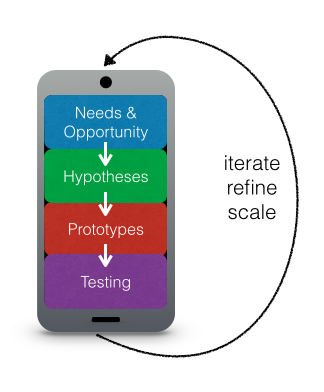Approach
There are many possible approaches to the questions that we are hoping to answer. Due to the multiplicity of perspectives, it seems worthwhile to state our working assumptions and non-goals, as they have as much impact on our approach choices as our goals.
An optimistic research mindset
While we have opinions about the charactersitics of technological architectures which we feel power a humane and dynamic web, we are also quite aware that decisions made in one context often aren't appropriate, applicable, or even simply useful in another context. We will therefore enter debates with a curious and constructive approach -- what is going on here, what are the overlapping interests among all of the parties involved, and can we come up with an experiment which would satisfy many of these interests?
Progressive refinement and iteration
It is clear that a 6-month project will at best point a general direction for futher work. We're satisfied with that level of certainty in even the most successful outcome, as from that general direction we can hope a later stage of work could provide further refinement. Even within the 6-month project period, we will engage in iterations that will ask progressively sharper questions.

1. Needs & Opportunity analysis at the root
Our initial explorations will likely be conceptual and quite removed from technology. We'll ask questions (of individuals, analysts, partners, and data sets) such as:
- which segment of what population should we work for?
- what parts of their lives are both limiting their economic development and feel close to opportunity?
- which of those are most likely to be helped by a technology-based change?
We will use a combination of in-the-field user research and co-design approaches, along with international collaborations, to identify some hypotheses (e.g. "young women in rural areas could use mobile phones to share important stories about health care choices and resources.").
2. Research drives hypothesis creation
This high level analysis will help us formulate more specific hypotheses, which we will then test with prototypes of various fidelity. If we were for example to tackle the hypothesis above about communities of rural women sharing information about health care resources, we might build specific prototypes, based on an understanding of the relationship this population has with existing sources of health care information, whether governmental, NGO or community-based.
3. Hypotheses drive Software & Design prototypes
As we dig into the higher level questions around kinds of content, distribution models, discovery and feedback, we expect to shift to higher fidelity prototypes that will surface not only the technological capabilities which may need invention, but also remove the layers of interpretation inherent in either abstract problem presentation or low-fidelity prototypes. We expect to test things on various platforms, especially FirefoxOS on a few hardware platforms and Firefox for Android, to combine rapid prototyping capabilities while at the same time forcing us to confront the places where our prototypes may not fit with practical technical constraints.
4. Testing to validate the approach and identify scaling opportunities
The purpose of testing the prototypes is not just to test "did they meet the goals identified by a particular community", but to understand what it would take to deploy the program/approach/technology on a larger scale. Are there concepts that may have emerged in one location but which are relevant across a region? Are there technological or other hurdles which stand in the way of having a broader impact?
Networked multi-scale teamwork, open to participation at all levels

Field testing will occur in at least three different geographies (India, Bangladesh, Brazil). We are privileged to belong to various networks (both Mozilla-specific and otherwise) of individuals and communities around the world who may want to participate in various capacities. We will both intentionally structure the program to allow both for local teams to move fast and engage with local communities without the burden of either central control or internet mediation, as well as regular, coordination meetings, where information can flow along all of the various network links.
Regular communications
There will be a set of final reports at the conclusion of the project, but we believe it critical to communicate broadly and specifically along the way as well. Our insights, questions, explorations, blind alleys, interim successes and failures will be published periodically. This kind of open communication will make it easier for the project contributors to understand what's going on, as well as hopefully be an invitation to new participants, especially those who may not be connected to Mozilla yet, but who have distinct experience in related fields.
comments powered by Disqus